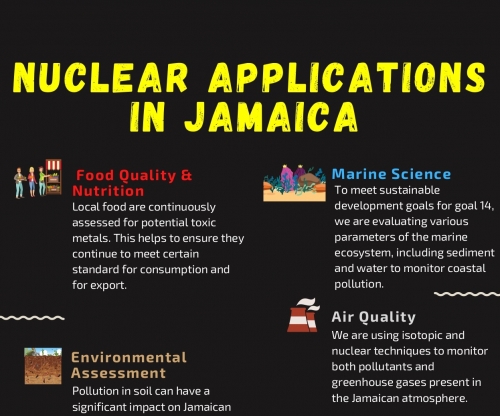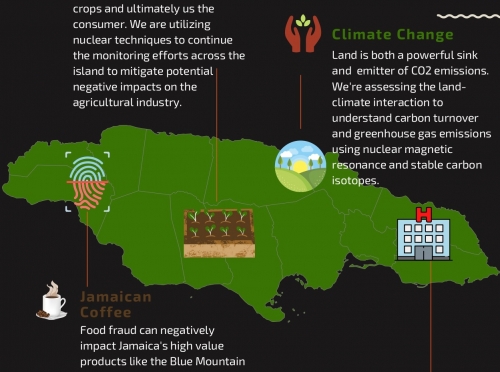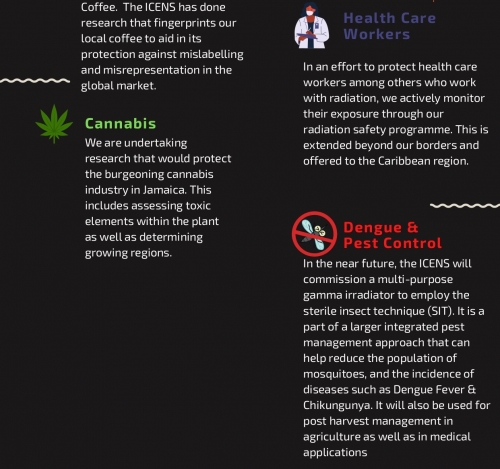Nuclear in Jamaica: THE INTERNATIONAL CENTRE FOR ENVIRONMENTAL AND NUCLEAR SCIENCES (ICENS)

Professor Charles Grant, FinstP Director General of the ICENS, UWI MONA
Over 36 years ago, Professor Lalor, along with then Vice Chancellor, Aston Preston, recognized the role that nuclear technology could play in the advancement of inter-disciplinary work, with inputs from Natural Science, Medical Science and the Social Sciences; this resulted in the installation of the SLOWPOKE-2 Research Reactor at ICENS (formerly the Centre for Nuclear Sciences), as the flagship of the institution.
Our multi-disciplinary approach is particularly poignant in today’s closely interdependent and interconnected world, where it is now recognized that environmental, agricultural, nutritional and health problems are increasingly shaped by the same powerful forces. Many of the unintended consequences of global development have led to climate change, the emergence of new or accelerated spread of diseases such as the Chikungunya and Zika viruses and Non-Communicable Diseases.
ICENS is now a mature institution, we are now in our fourth decade, we have become increasingly aware that many of the daunting challenges that Jamaica faces are shared by our Caribbean brothers and sisters and by extension Small Island Developing States around the world. We have made our mark globally and have become regional leaders in the application of nuclear technology. It is with this global picture in mind that ICENS will continue to build on the foundational work of the first 36 years and tackle with vigour and optimism the new problems we share as a community.
As the third Director General of ICENS it is my intention to keep the institution focused on the application of high quality science, utilizing nuclear technology to contribute to the country’s development agenda as directed by its Vision 2030 Jamaica, and to Regional development through the United Nations Sustainable Development Goals. We will continue to make significant impact on the understanding of climate smart agriculture, trace elements and health, air quality monitoring, food safety and security, control of the Aedes Aegypti Mosquitoes as vectors of human pathogens, and increased agricultural productivity through plant mutagenesis and the eradication of the West Indian Fruit Fly (Anastrepha obliqua).
We are well-equipped to excel in the unique role envisioned so many years ago, serving as a catalyst for national and regional sustainable development, motivated by a common understanding of our problems and the desire to be self-reliant

The International Centre for Environmental & Nuclear Sciences (ICENS), which is a joint venture between the University of the West Indies (UWI) and the Ministry of Science, Energy, and Technology (MSET), is a multidisciplinary research facility that is home to the only research reactor in the English-speaking Caribbean.
Most people who are familiar with nuclear reactors know that they can be used to produce power. Our SLOWPOKE-2 reactor is a small low power research reactor that we use for the analysis of various samples of interest.
But how does it do that?
We introduce the sample into the core of the reactor where it is bombarded by neutrons, making some of the atoms in the sample temporarily radioactive. As these radioactive nuclides decay, they emit gamma rays whose energies are characteristic for each nuclide. Almost any material can be analyzed. It is an ideal method that requires very little sample mass and provides low detection limits for most elements of interest. At least fifty major, minor, and trace elements spanning the main geochemical element groups can be readily determined from milligrams, micrograms and even nano grams, although sensitivity varies by element.
In Jamaica, the ICENS has pushed research that has positively impacted various sectors in Jamaica. When you think about nuclear, think beyond energy and consider applications in agriculture, food fraud, environmental monitoring, climate change and health. These are the areas in which the ICENS has played a significant role.
What are the benefits of nuclear technology in Jamaica?
Nuclear technology plays a valuable role in helping us understand Jamaica’s environment. Through varied applications, we are able to understand how environmental systems function and interact, and the potential negative impacts on the environment. Researchers at the ICENS can study paleoclimate variability over millions of years to better understand ocean, land, and atmospheric interactions of the climate system.
Further, the reactor and its facilities have sensitized private and public entities in various areas including:
‣ First responders in addressing emergencies involving nuclear and radioactive materials
‣ Customs officers in the detection of radioactive materials in cargo
‣ Radiation safety officers in medical and industrial facilities and,
‣ Regulators in the industry



This week is internationally recognized as Nuclear Science Week. As the sole nuclear facility in the English-speaking Caribbean, we are excited to shed some light into the world of nuclear. This week we will be highlighting various careers in nuclear, giving insight into the pioneers in the industry as well as offering educational opportunities to learn more about nuclear science and its applications. We welcome you to connect with us online.



